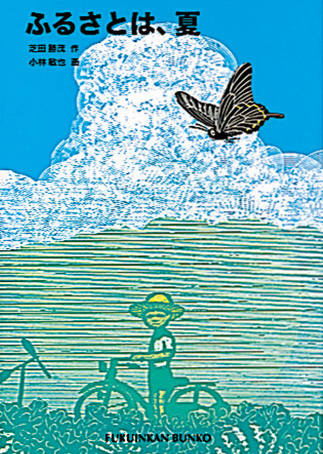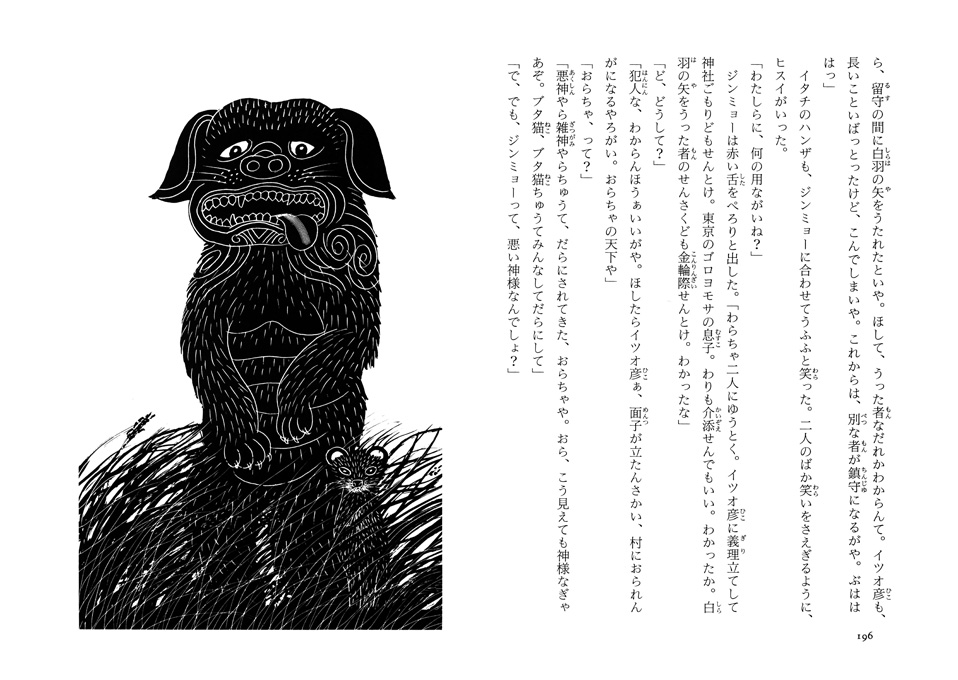One summer vacation, Michio’s parents are too busy with work for him to stay home, so he is sent to his father’s hometown in the countryside for a month. Michio’s father is on poor terms with his own parents, almost to the point of estrangement, so this will be Michio’s first visit to their home, and an entirely new experience for him.
In their village, an annual tradition involving lifting rice bags as a test of strength is revived after being abandoned for some time. Michio takes part, and just barely manages to lift the bag for children before falling over. Embarrassed, he runs from the venue and meets a girl outside named Hisui. Then a white-feathered arrow—said in Japanese folklore to mark the roof of a village household selected by a local deity to provide a girl as human sacrifice—lands nearby, and events take a dramatic turn. Michio runs into a series of suspicious-looking kami (gods) and yōkai (monsters): a god that makes people forget by exhaling on them with breath that smells of myōga ginger, a giant cat god named Butaneko (Pig-Cat), a god of the fields, a god of wealth posting as a god of poverty, a long-haired creature named Nekome (Cat’s Eyes) who does indeed have the eyes of a cat and claims to have taught the villagers to weave, the god of a nearby reservoir, and more. These colorful figures have maintained a quirky, cheerful bond with humans in traditional society over the generations, and the author deftly uses them as a canvas onto which traditional Japanese culture and views of nature are projected.
Through mystical encounters with these comical, all-too-human beings, the mystery of the white-feathered arrow loosed toward Michio and Hisui is gradually revealed. This strange, thrilling summer adventure in a simple village that seems almost frozen in time is both Michio’s first step toward independence and his romantic awakening. His otherworldly experiences in his father’s hometown also give him confidence in the unshakeable bonds he shares with his parents. (NA)
In their village, an annual tradition involving lifting rice bags as a test of strength is revived after being abandoned for some time. Michio takes part, and just barely manages to lift the bag for children before falling over. Embarrassed, he runs from the venue and meets a girl outside named Hisui. Then a white-feathered arrow—said in Japanese folklore to mark the roof of a village household selected by a local deity to provide a girl as human sacrifice—lands nearby, and events take a dramatic turn. Michio runs into a series of suspicious-looking kami (gods) and yōkai (monsters): a god that makes people forget by exhaling on them with breath that smells of myōga ginger, a giant cat god named Butaneko (Pig-Cat), a god of the fields, a god of wealth posting as a god of poverty, a long-haired creature named Nekome (Cat’s Eyes) who does indeed have the eyes of a cat and claims to have taught the villagers to weave, the god of a nearby reservoir, and more. These colorful figures have maintained a quirky, cheerful bond with humans in traditional society over the generations, and the author deftly uses them as a canvas onto which traditional Japanese culture and views of nature are projected.
Through mystical encounters with these comical, all-too-human beings, the mystery of the white-feathered arrow loosed toward Michio and Hisui is gradually revealed. This strange, thrilling summer adventure in a simple village that seems almost frozen in time is both Michio’s first step toward independence and his romantic awakening. His otherworldly experiences in his father’s hometown also give him confidence in the unshakeable bonds he shares with his parents. (NA)





